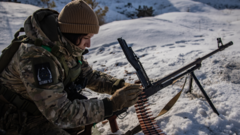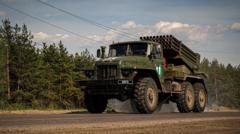**The foreign ministers signed a peace accord in Washington, supervised by US Secretary of State Marco Rubio, amidst growing tensions and humanitarian crises.**
**A New Dawn: DR Congo and Rwanda Forge Path to Peace**

**A New Dawn: DR Congo and Rwanda Forge Path to Peace**
**A historic agreement aims to quell ongoing hostilities and address sovereignty between DR Congo and Rwanda.**
The Democratic Republic of Congo (DRC) and Rwanda have taken significant steps towards addressing longstanding tensions by signing an agreement designed to uphold each nation’s sovereignty and outline a peace plan, expected to be drafted by May 2. The signing took place in Washington, with US Secretary of State Marco Rubio in attendance, highlighting international involvement in the peace process.
The backdrop to this accord is troubling; recent months have seen a humanitarian crisis unfold, with hundreds of thousands of people displaced due to the advances of Rwanda-backed M23 rebels, who have gained control over key areas in eastern DRC, including the vital cities of Goma and Bukavu. This escalation prompted the DRC government to seek assistance from the US, offering access to its abundant mineral resources as part of the negotiations.
In what is perceived as a hopeful sign, both nations have committed to dialogue, with expectations of significant investments coming from the US and private sector, aimed at fostering stability in the region. Yet, even amidst these discussions, reports indicate that skirmishes continue in North Kivu province, exemplifying the complexities that lie ahead.
Earlier statements from both the DRC government and the M23 rebels suggested a mutual commitment to peace, with aspirations to achieve a lasting ceasefire. However, the ramifications of the ongoing conflict are stark, with estimates indicating that approximately 7,000 lives have been lost since the beginning of the year, raising concerns about a potential regional conflict if left unresolved.
The DRC has accused Rwanda of providing military support to M23, a claim Rwanda has consistently denied, despite international affirmations from both the UN and the US. The current agreement could mark a pivotal moment in the search for a resolution, but the journey toward peace remains fraught with challenges.
The backdrop to this accord is troubling; recent months have seen a humanitarian crisis unfold, with hundreds of thousands of people displaced due to the advances of Rwanda-backed M23 rebels, who have gained control over key areas in eastern DRC, including the vital cities of Goma and Bukavu. This escalation prompted the DRC government to seek assistance from the US, offering access to its abundant mineral resources as part of the negotiations.
In what is perceived as a hopeful sign, both nations have committed to dialogue, with expectations of significant investments coming from the US and private sector, aimed at fostering stability in the region. Yet, even amidst these discussions, reports indicate that skirmishes continue in North Kivu province, exemplifying the complexities that lie ahead.
Earlier statements from both the DRC government and the M23 rebels suggested a mutual commitment to peace, with aspirations to achieve a lasting ceasefire. However, the ramifications of the ongoing conflict are stark, with estimates indicating that approximately 7,000 lives have been lost since the beginning of the year, raising concerns about a potential regional conflict if left unresolved.
The DRC has accused Rwanda of providing military support to M23, a claim Rwanda has consistently denied, despite international affirmations from both the UN and the US. The current agreement could mark a pivotal moment in the search for a resolution, but the journey toward peace remains fraught with challenges.



















